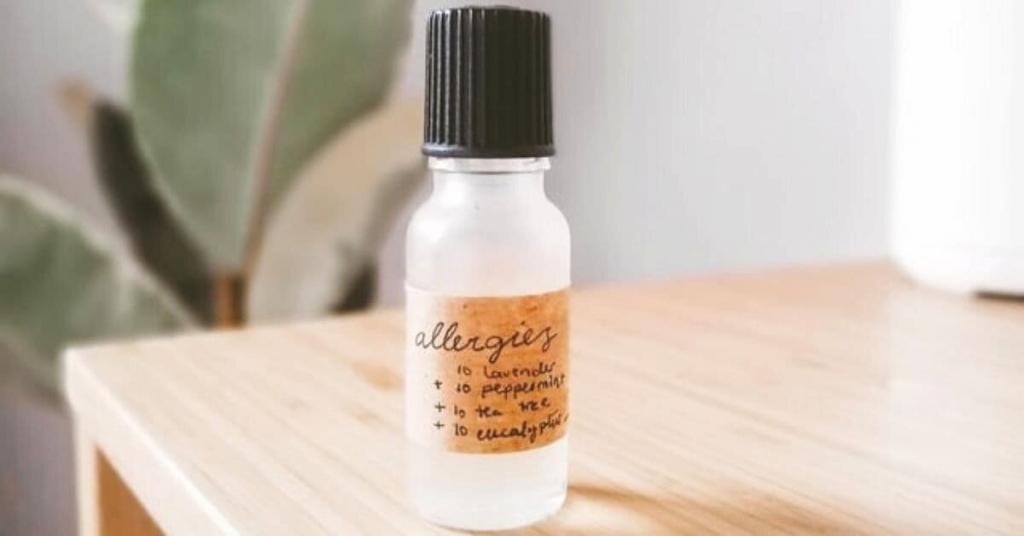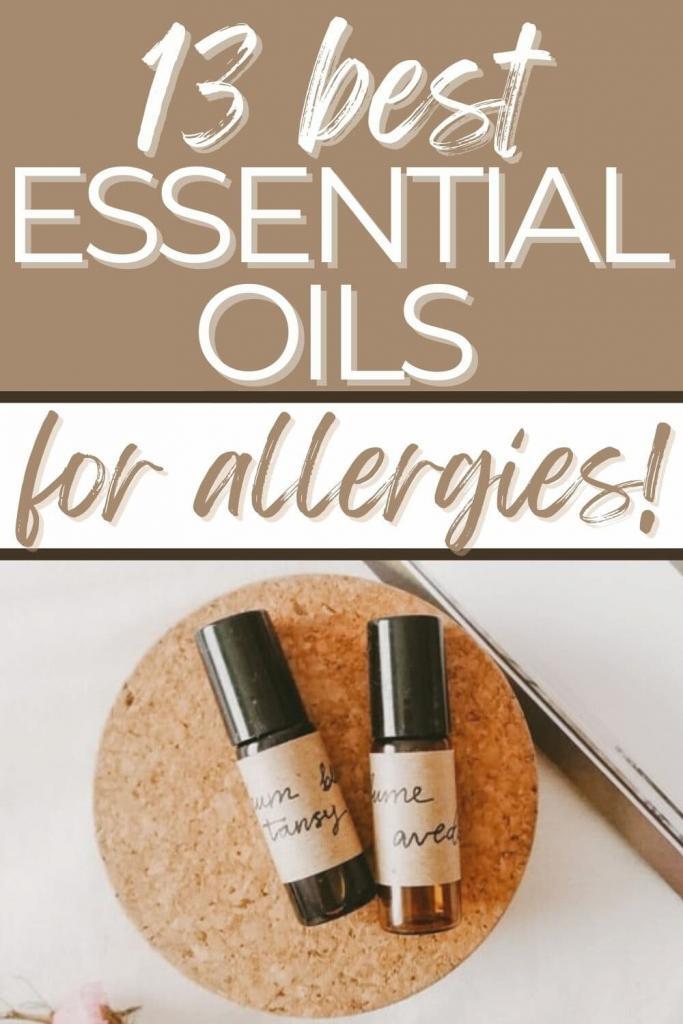Do you suffer from allergies? If so, you know how miserable they can be. Itchy eyes, a runny nose, and a sore throat are just a few of the symptoms that can make life difficult during allergy seasons. Thankfully, there are some essential oils that can help provide relief. In this blog post, we will discuss 13 of the best essential oils for allergies.
If you’re ready to learn more about how essential oils could help you, let’s get started!

This post may contain affiliate links, which means I’ll receive a commission if you purchase through my links, at no extra cost to you. Please read full disclosure for more information.
13 Essential Oils For Seasonal Allergies
When most people think of essential oils, they think of aromatherapy. However, essential oils can also be used to provide relief from a variety of health conditions, including allergies.
In fact, there are many different essential oils that can help relieve allergy symptoms.
1. Lavender Oil
First on the list is lavender.
Lavender oil is one of the most popular essential oils and for good reason!
Not only can it be calming for the nervous system and reduce stress and anxiety- it’s also beneficial for allergies.
Lavender essential oil can be used to help lower inflammation, reduce congestion, and other allergy reactions.
It has anti-inflammatory and antihistamine properties, which makes it an ideal choice for excess mucus, hay fever, itchy noses, and other allergy symptoms.
Lavender’s advantages don’t end there, though. It’s one of the greatest essential oils for skin allergies, such as eczema and psoriasis, as well as insect bites and rashes since if applied topically it can relieve itching and pain while supporting the healing process in a natural and safe way.
2. Peppermint Essential Oil
If you’re looking for an essential oil that can provide relief from all types of allergies, peppermint oil is a good choice.
Peppermint oil can reduce inflammation and decongestion, which makes it effective at relieving a variety of allergy symptoms.
Although peppermint oil is not considered a natural antihistamine, it is still very helpful if you need to clear congestion and inflammation of blocked nasal passages.
Inhaling peppermint oil can also help to open up the airways and provide relief from sinus pressure.
3. Lemon Essential Oil
Lemon oil is another great choice if you suffer from allergies.
This essential oil can help if you suffer from congestion, runny nose, or other common symptoms of allergies.
In addition, lemon essential oils can also help to boost the immune system.
This is important because a strong immune system can help to prevent allergies from developing in the first place.
4. Eucalyptus Essential Oil
Eucalyptus oil is another essential oil that can be helpful if you find yourself stuffy and miserable.
This oil has anti-microbial, anti-inflammatory and decongestant properties, which makes it effective at clearing a stuffy nose and respiratory system congestion and helping to relieve other allergy symptoms.
It’s also helpful for opening up the airways due to sinus infections or allergic rhinitis and relieving sinus pressure.
Inhaling eucalyptus oil can also help to reduce airborne pathogens, which can help to reduce the severity of symptoms related to allergies.
5. Tea Tree Oil
Tea tree oil is an essential oil with antimicrobial, anti-inflammatory, and decongestant properties.
All of these properties make it effective at relieving a variety of symptoms, including runny nose, watery eyes, itchy throat, and congestion.
This essential oil can also help support your body and may be effective at helping to fight infections.
Tea tree oil should be used with caution, however, as it can cause skin irritation in some people.
If you have sensitive skin, it’s best to dilute tea tree oil with a carrier oil before applying it topically.
6. Frankincense Oil
Frankincense oil is an essential oil with anti-inflammatory, antispasmodic, and expectorant properties.
These properties make it effective at relieving a variety of symptoms, including runny nose, watery eyes, itchy throat, and congestion.
Frankincense can also help to boost the immune system and fight off infection.
Frankincense oil is also beneficial for mental health, as it can be calming and reduce stress and anxiety.
This makes it a good choice for people who are struggling with seasonal allergies and anxiety.

7. Roman Chamomile Essential Oil
Roman chamomile oil is a good choice for people who are looking for an essential oil that can help to relieve anxiety and stress related to seasonal allergies.
This oil has antidepressant, antispasmodic, and anti-inflammatory properties, which make it effective at relieving a variety of seasonal allergic reactions.
A few drops of this popular essential oil is also beneficial for the mental health of allergy sufferers, as it can be calming and reduce stress and anxiety.
8. Holy Basil Oil
Holy Basil Essential Oil has many benefits.
It has antibacterial qualities and can eliminate toxins from the body and clear respiratory passages.
Holy Basil is a distinct variety of basil distinguished by its own set of characteristics and advantages.
Holy Basil can assist with respiratory function, particularly in the area of allergic inflammation of the nose and sinuses, during the seasons.
It’s also an adaptogen oil, which means it may help to relax or stimulate the body as needed.
9. Thyme Essential Oil
Thyme essential oil is one of the best oils for allergy relief. It can help to reduce inflammation and congestion, and it also has antimicrobial properties that can help to keep your respiratory system healthy.
Thyme essential oil is also a great oil to use for massages, as it can help to relax the muscles and ease tension.
If you are looking for a natural way to reduce your symptoms during allergy season, be sure to try out thyme essential oil!
It is one of the most effective oils for relieving allergies and it has a host of other benefits as well.
10. Rosemary Oil
Rosemary essential oil is beneficial for many respiratory ailments, including allergies.
This oil is a natural anti-inflammatory, antihistamine and decongestant, which makes it ideal for allergy relief.
It helps to improve circulation, clear congestion and inflammation in the nasal passages, making it easier to breathe.
Additionally, rosemary oil has a refreshing scent that can help to improve your mood and combat fatigue during allergy season.
Try diffusing rosemary essential oil in your home or office to help keep your airways clear and improve your breathing.
You can also add a few drops of rosemary essential oil to a carrier oil and massage it into your chest and sinuses for additional relief.
11. Sweet Orange Essential Oil
Sweet orange oil is known for its refreshing and uplifting scent. It’s also a great essential oil for allergy relief.
The beneficial properties of sweet orange oil help to reduce inflammation in the nasal passages and throat, which can help to relieve symptoms of allergies.
Additionally, the antiseptic properties of sweet orange oil can help to kill bacteria and viruses that can cause allergies.
12. Balsam Fir Oil
Balsam fir oil’s high concentration of terpinenes gives it anti-microbial, anti-inflammatory, expectorant, and decongestant properties, making it one of the best essential oils for allergy relief.
When diffused, balsam fir oil can help to clear congestion and ease breathing.
It can also be applied topically to the chest and sinuses to help relieve congestion.
13. Blue Tansy Essential Oil
Blue Tansy oil has a sweet, herbaceous aroma and is high in monoterpenes, which are known for their anti-inflammatory properties.
The natural properties of blue tansy oil can help to relieve the symptoms of allergies, such as inflammation and congestion.
The oil can be diffused or applied topically to help relieve allergy symptoms.

What Are The Best Ways To Use Essential Oils?
There are a few different ways that you can use essential oils for allergies.
You can…..
- diffuse the oils in your home or office
- apply them topically
- use a personal inhaler
- spritz your sheets or a piece of cloth with linen spray
- use with a warm or cold compress
Now that we’ve gone over a few essential oils that can help reduce allergy triggers and symptoms, here are tips for use and must-have essential safety info.
Must-Have Essential Oil Safety Info
Essential oils are incredibly beneficial but it is essential to be informed about how to use them safely.
Here are a few things to keep in mind:
1. Don’t ingest essential oils
Do not ingest essential oils (even the ones that are considered “high-quality essential oils”) unless you are working with a VERY knowledgeable professional that advises this.
It is also not advisable to use essential oils in a nasal spray unless advised to do so by a professional.
Using a Nasaline system, trying a xylitol nasal spray, or even a salt inhaler are all safer options if you are looking to reduce allergy triggers and find relief from nasal congestion!
2. Dilute properly before using topically
Essential oils are strong so be sure to dilute them properly with a carrier oil. Popular carrier oils include:
- olive oil
- jojoba oil
- coconut oil
- sweet almond oil
If you’re not sure of how to dilute properly you can find a handy dilution chart here.
3. Diffuse safely
Diffusing essential oils can be a great way to incorporate essential oils and experience their health benefits, but it must be done safely.
Be sure to diffuse in well-ventilated areas for only 30-60 minutes at a time. And always be cautious around pets, children, and sensitive people who may have an allergic reaction.
4. Do a patch test
Before you use a new essential oil be sure to do a patch test to ensure that you do not have a reaction to that particular oil. All you have to do is properly dilute, apply topically to a small area, and wait 24 hours. Then recheck the area for redness other signs of allergic reaction.
5. Do not apply near your eyes
Do not apply essential oils near your eyes and be sure to wash your hands well after handling oils.
Undiluted oils can cause skin irritation and even burns.
Last Thoughts…
Now that you know a bit more about essential oils and how they can be used to safely reduce allergy symptoms, give some of them a try!
You may find that you prefer one oil over another or even like to mix a few together.
Remember- always take safety precautions when using essential oils and do not hesitate to contact a professional with any questions.
Related Articles
- Homeopathic Remedies For Allergies: 11 Options For Fast Relief!
- 10 Best Herbs For Allergies
- Stinging Nettle Infusion: Benefits, Recipe, & Helpful Tips
- 13 Natural Decongestants (That Work Fast!)
- Xylitol Nasal Spray: Effective Natural Relief For Nasal Congestion
- Nasaline: A Nasal Rinsing System For Sinus & Allergy Relief
- Indoor Air Quality: 14 Easy & Natural Tips To Improve The Air You Breathe



Thank you for the great info! Straightforward and informative, I really appreciate the links you provided as well as safety info.
Excellent article!
Thank you, Amanda!
I’m so glad you like the article and info, I hope it helps 🙂